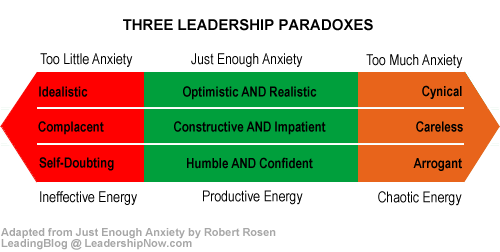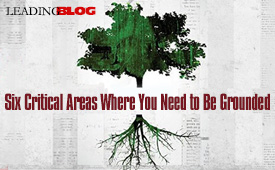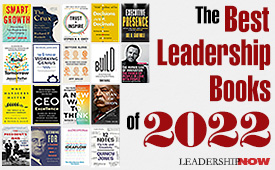 |
 |
04.23.08

How To Have Just Enough Anxiety
 Balance comes from a right attitude and a proper perspective. Dealing with anxiety is no different. The success of great leaders is all about creating the right level of anxiety for growth and performance. It is their uncommon ability to create just enough tension—within themselves and their organizations—that unleashes the human energy that drives powerful leadership, accelerated growth, and winning companies.What’s wrong with having too much or too little anxiety? RR: Too much anxiety comes from negative thinking. When we feel too much anxiety, we attack change. We become combative or controlling as we try to ease the pain we feel. Too little anxiety is grounded in contentment. When we feel too little anxiety, we avoid change. We value the status quo and believe everything will be okay as long as everything stays the same. If your company is going through tough times like a bad economy or a merger, you definitely don’t want too little anxiety. What exactly is “just enough anxiety”? RR: The right level of anxiety gives individuals and organizations an emotional charge that helps us thrive in an uncertain world. As we allow ourselves to experience anxiety as our natural response to change, and learn to modulate it, we’re able to live in the world as it is instead of struggling to make it what we want it to be. And as we get better at living with just enough anxiety, it becomes the energy that drives us forward, stretches us, and challenges us to be better tomorrow than we are today. How can leaders manage anxiety instead of letting it manage them? RR: It starts with self awareness. Leaders who understand what makes them anxious are better able to increase or decrease their anxiety, as needed to create just enough. But, more than that, it has to do with how they relate to change and uncertainty. By admitting what they can and can’t control, they’re able to take charge of their lives while remaining open to the unexpected. They’re at home in uncharted territory. Instead of seeing anxiety as the enemy, they recognize it as their natural companion on the path of change.    
Posted by Michael McKinney at 10:30 AM
|
BUILD YOUR KNOWLEDGE


How to Do Your Start-Up Right STRAIGHT TALK FOR START-UPS 
Grow Your Leadership Skills NEW AND UPCOMING LEADERSHIP BOOKS 
Leadership Minute BITE-SIZE CONCEPTS YOU CAN CHEW ON 
Classic Leadership Books BOOKS TO READ BEFORE YOU LEAD |